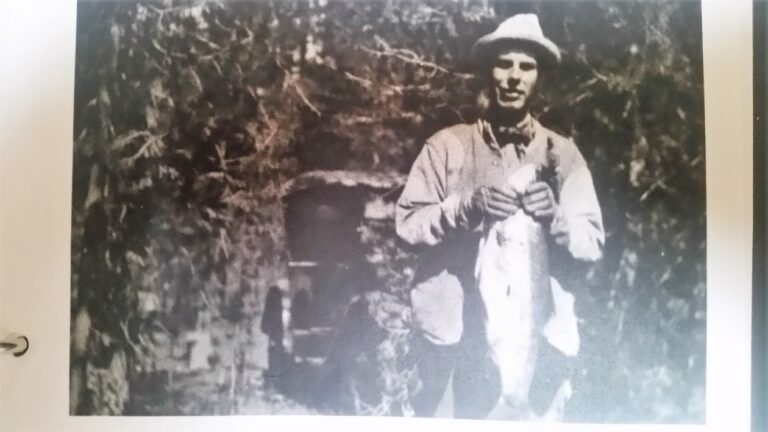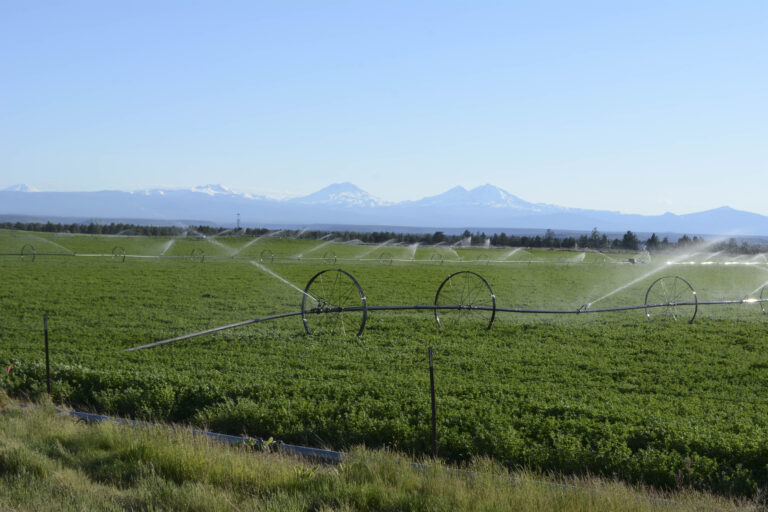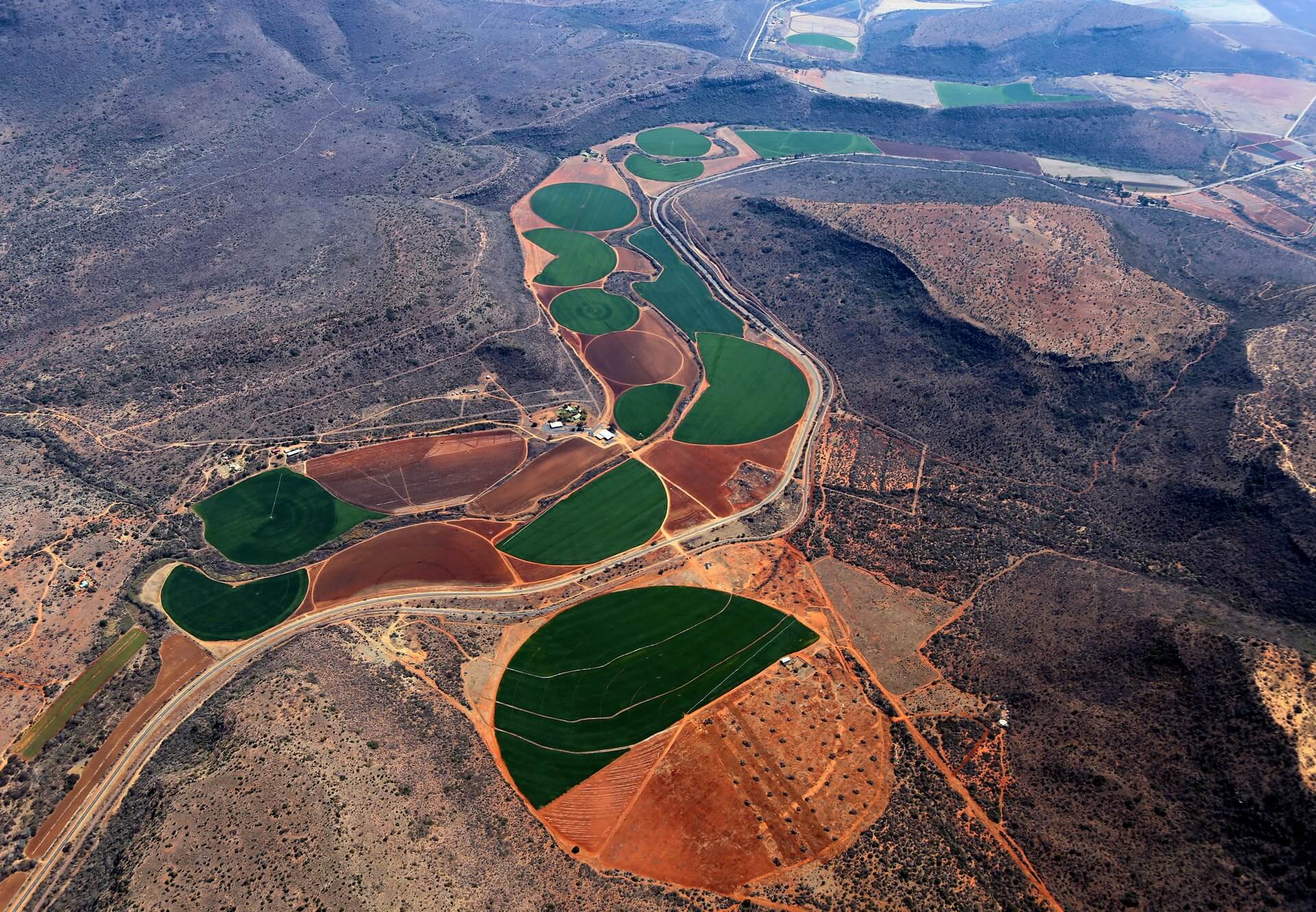All around the world, irrigation for agriculture is taking massive amounts of water from rivers, in many cases leaving them almost or entirely dry. This article comes from central Oregon, where 90% of human water use is for agriculture.
Low Flows Due to Irrigation Destroying Deschutes River
by George Wuerthner / The Wildlife News
The recent article “Low Flows On Deschutes” highlights why irrigation is a significant threat to our river’s ecological integrity.
According to the report, flows on a portion of the Deschutes dropped to 60 CFS leaving many parts of the river channel dry. To put this into perspective, historically, before irrigators took our water from us, the river ran at 1000-1200 CFS year-round. As a spring-fed river, the Deschutes supported outstanding fisheries.

Huge trout caught out of the Deschutes near the turn of the century before irrigation destroyed the river.
This tragedy continues because the public is not standing up for its rights. We, the people, own the water in the river, not the irrigators. We allow the irrigators to take water from the river without any compensation to the public, and regardless of the damage done to aquatic ecosystems. This system was devised by irrigators to serve irrigators a century ago.
Isn’t it time for us to enter the modern age? Using water in the desert to grow hay for livestock is just a crazy waste of a valuable resource. Keeping water in the river would provide for greater recreational use. And maintaining viable flows would protect aquatic life like spotted frogs, trout, and salmon, not to mention all the other water-dependent species like eagles, mink, otter, and the rest.
Despite the claims to “water rights” the actual water in all state rivers belongs to Oregon citizens as affirmed by the Oregon Supreme Court.
“All water within the state from all sources of water supply belongs to the public,” including ground water. The Act allows for instream water rights for public uses, and public uses include but are not limited to recreation, “conservation, maintenance and enhancement of aquatic and fish life, wildlife, fish and wildlife habitat and any other ecological values,” pollution abatement, and navigation. In addition, “public uses are beneficial uses,” but “[t]he recognition of an in-stream water right . .. shall not diminish the public’s rights.”

The majority of water removed from the Deschutes is used to grow irrigated pasture and hay for livestock not crops consumed directly by humans. Photo by George Wuerthner
Technically speaking, degrading the river by irrigation should be illegal since the public values are supposed to be given priority in any water allotments.
Maybe it made sense to dewater our rivers to promote Ag a century ago when there were fewer economic opportunities. However, today Ag contributes only to 1.3% of Deschutes County income.
One can make a case that the 1% are degrading our river that belongs to all citizens for their private profit.
It is time to modernize our approach to water use. Growing cow food in the desert is a senseless waste of a valuable resource—water. We need to put the welfare of the river ecosystem and all citizens first.
George Wuerthner is an ecologist and former hunting guide with a degree in wildlife biology.


Correction to the sentence just below the photo of the man with a fish: “We, the people” DO NOT “own the warer in the river.”
We are but one of the thousands of species that use the water. The only thing unique about us is that we are the only species that abuses the river.
Like the Galapagos marine iguanas, people are trapped in the niches they are provided. Asking farmers to stop growing hay would be like asking the iguanas to stop diving for algae. The answer is to stop people from buying the hay. One way to do that might be to make the hay so expensive people can’t afford it. Or to reduce the demand for the livestock through economic, or other means, such as appealing to the end-consumer’s sensibilities or social pressure from the public at large. Or, of course, a combination of these. This is worthy of further study. We need a plan of action.
It isn’t just hay, it is all the crops that require irrigation that are taking water from rivers. Why do you think the water in the rivers are heating up? It is because the water is no longer able to make it to the rivers. The cold cool mountain water is now going into making wine.
Orchards, wineries, and even fields that grow hops are all using irrigation. It isn’t just about hay and livestock owners and to think so is narrow minded thinking. Sacramento Valley is a desert area and they are using irrigation to create rice paddy fields. Because that is sustainable… Maybe we as humans should stop eating luxury items like fresh fruit 365 days a year and consuming cheap wine because everyone should have it. Maybe we should stop producing milk for yogurt and ice cream, and cheese. You are right we should increase the price of a consumer industry that you probably know nothing about.
Alot of the hay and alfalfa in the area is actually being shipped over seas and the amount of irrigating that is paying taxes so thinking it is being done irrationally is wrong.